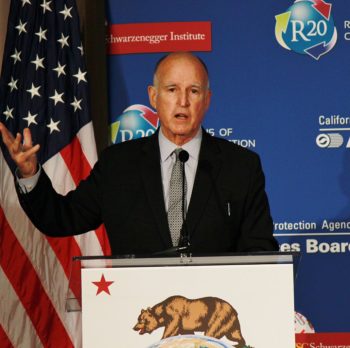
Environmental organisations have responded to a government proposal to decarbonise the economy with outrage. They say the Climate Action Plan 2050 will fall well short of meeting climate targets, and accuse the environment ministry of caving in to pressure from the economics ministry and Angela Merkel’s Chancellery to water down ambitious plans and drop important details, like a deadline for the coal exit. Germany is already struggling to meet its 2020 climate targets. –S√∂ren Amelang, Climate Energy Wire, 8 September 2016
The inability of the EU’s member states to agree on an effort-sharing deal could delay the ratification of the Paris Agreement until late 2017. The passionate speeches of the COP21, during which the EU boasted of having formed a High Ambition Coalition with the small island states and the US have been followed by a complete inability to come to any kind of agreement between member states. As a result, “I think it is highly unlikely that the EU will ratify the agreement before the end of the year,” said French Green senator Ronan Dantec. “Not everything is decided, notably on the phasing out of coal, and climate-sceptic governments are strong in Europe,” he added. –Aline Robert, Euractive, 7 September 2016
Britain is set to miss its 2020 European renewable energy targets, a parliamentary committee report said on Friday, setting a poor example for less wealthy countries as the world tries to rein in global warming. Britain has a target to meet 15% of its energy needs from renewable sources by 2020, but had achieved just over 8% by the end of 2015, according to the report, published today. “If the UK reneges on these targets, it will undermine confidence in the Government’s commitment to clean energy and the climate targets agreed in Paris,” said Angus MacNeil, chair of the cross-party Energy and Climate Change Committee. —EurActiv, 9 September 2016
Turkish coal plants are in line for eye-watering public subsidies and exemptions from environmental regulations, under an amended energy package delivered by the country’s parliament, late last week. Turkey is a member of the G20, whose two leading economies ‚Äì the US and China ‚Äì agreed to ratify the Paris climate change agreement on Saturday. But MPs and campaigners say that the new amendment known as Article 80 could instead open Turkey’s door to extraordinary largesse for the coal sector and other big energy projects, unfettered by environmental considerations. Turkey plans to build as many as 80 new coal plants in the next few years, on top of 25 that already exist, belching an extra 200m tonnes of CO2 emissions into the atmosphere each year. –Arthur Neslen, The Guardian, 6 September 2016
Jeremy Corbyn’s policies on energy have been condemned as “naive and short-sighted” by one of Labour’s major union backers. The GMB union, which represents energy workers, warned that “wishful thinking” would not keep the lights on as it tore into the Labour leader’s plans to ban fracking and phase out coal-fired power stations. A Corbyn-led Labour government would ban fracking, as extracting gas is “not compatible” with the UK’s climate commitments because it is a fossil fuel.
Justin Bowden, the GMB union’s national secretary for energy, said: “Wishful thinking doesn’t generate the power we need to heat homes, keep the lights on and the economy functioning; this means that until there are technological breakthroughs in carbon capture or solar storage then gas and nuclear power are the only reliable, low-carbon shows in town for all those days when the sun doesn’t shine and the wind doesn’t blow. Limiting the UK’s options on achieving energy self-sufficiency by proposing an outright ban on fracking is naive and short-sighted.” —Press Association, 7 September 2016
















